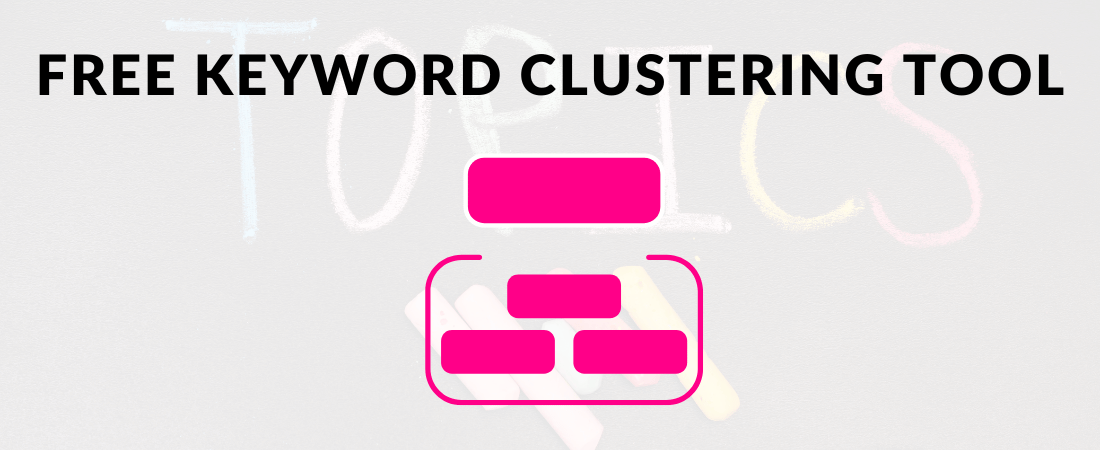
Using the right keywords is crucial to the success of any website and its search engine optimization (SEO) efforts. However, with so many keywords available, it’s essential to organize them effectively. This is where keyword clustering comes in. Keyword clustering is the process of grouping together related keywords into clusters to better understand keyword opportunities and create more effective content and keyword strategies. If you want to learn more about SEO strategies Topical Maps Unlocked offers a step-by-step guide to gaining instant ranking authority by simplifying keyword research, effective interlinking, creating a coherent topical map, and devising a comprehensive content plan.
In this post, we’ll discuss what keyword clustering is, why it’s important, and explore the best free keyword clustering tools.
What is Keyword Clustering and Why Is It Important?
So, what is keyword clustering, and why is it important? Keyword clustering involves the grouping of related keywords into clusters. With a plethora of keywords available, distinguishing and categorizing these topics autonomously becomes daunting. That’s where keyword clustering tools come in handy. These intelligent tools enable you to cluster similar keywords together, thereby simplifying the process and eliminating the manual efforts.
Keyword Clustering is simply a process of grouping relevant keywords into clusters based on how they fit into the overall content. The most significant advantage of doing this is that you’re not only creating a keyword list but also a content map that provides direction and structure for your content.
Keyword clustering is an effective program that’s essential to anyone into Search Engine Optimization (SEO). It helps in grouping keywords for a streamlined focus on a selected group of related words which enhances your site’s Google search visibility. Better visibility translates into a better engagement rate, which is a win-win for everyone involved.
Entering the clusters of keywords that align with your topics into the keyword clustering tools helps filter the noise. Out of multitudes of possible groups, you’re now presented with the best and the most relevant only. It also helps to sort out and cluster long-tail keywords that could yield better-targeted results.
Keyword clusters are essential as they help in identifying high-priority topics that are pertinent to your business or brand. Moreover, it helps you develop a comprehensive content map that aligns with the search intent of your audience. It also simplifies the process of identifying gaps in your content, enabling you to provide relevant information that your audience needs. Thus, both the keyword clustering tool and the process itself play a crucial role in enhancing your SEO endeavors.
Mastering Keyword Cluster Using Free Keyword Clustering Tool
As a digital marketer, mastering the art of keyword clustering can be crucial, and what better way than using a free keyword clustering tool? These keyword clustering tools and keyword grouping tools are designed to provide comprehensive keyword insights, helping you to create specific keyword groups for better SEO tactics. This is where our free keyword grouping tool comes into play.
Generating one of the most efficient clusters is no longer a daunting task with the aid of tools. The cluster keywords function can group keywords based on their similarity and relevance. They provides in-depth keyword analysis, which includes both long and short google keywords. The tools fosters in enhancing your keyword manager capabilities, offering your pages a higher rank on search engines.
Apart from making your pages more SEO friendly, this free keyword clustering tool aids in listing out the most popular and imperative keywords for your content. Focused mainly on long keywords, it picks out the most searched ones from your list and clusters them together. With this softwares, get a grip on the dense domain of keyword clustering, and effectively manage your keyword groups.
Top Free Keyword Clustering Tools
There are several free keyword clustering tools that can help you with this process, some of which include:
- SEMrush Keyword Magic Tool
SEMrush is known for its suite of SEO tools, and the Keyword Magic Tool is one of its highlights. Though SEMrush as a whole isn’t free, they do offer limited features in their free plan. This tool allows you to enter a seed keyword, and it generates related keyword suggestions. From there, you can group and cluster keywords based on different topics or themes.
- Keyword Sheeter
This tool can pull thousands of autocomplete suggestions from a seed keyword. While it doesn’t automatically cluster keywords, the sheer volume of suggestions can be beneficial. You can then manually sort through them or use other software to group them.
- Google Ads Keyword Planner
While primarily designed for PPC campaigns, this tool from Google gives a list of keyword ideas based on a seed keyword. You can derive clusters from the ad group ideas provided or from the list of keyword suggestions. Although it doesn’t automatically cluster in the traditional sense, the ad group suggestions often act as mini keyword clusters.
- WordStream’s Free Keyword Tool
WordStream’s tool is another PPC-focused tool that can be used for keyword clustering. When you input a seed keyword, the tool returns a list of related keywords. From there, you can group these keywords into clusters manually or with the help of other software.
- Textalyser
Textalyser is a free online tool that can help you analyze your content and identify thematic clusters. It does this by displaying co-occurrences of words and phrases to help you identify commonalities and differences.
- Keyword Grouper
Keyword Grouper is a free online tool that groups your keywords together based on your preferred settings. You can choose between single, double, or triple word clusters, and you can also add keywords manually.
- Soovle
Soovle is a free online tool that provides real-time suggestions from Google, Bing, Amazon, and others. The tool allows you to compare keyword results across different engines and suggest commonalities for clustering.
- Ubersuggest
Ubersuggest is a free tool that provides keyword ideas, keyword search volume, and other metrics to help you with keyword research. Additionally, Ubersuggest provides “related keywords” that can be used in keyword clustering strategies.
Aligning SEO Strategies with Grouping Keywords into Clusters

Aligning SEO strategies with grouping keywords into clusters is not just a trend, it’s a necessary SEO tactic. Organizing clusters of related keywords, keyword grouping, can make SEO content more likely to be found by a wider variety of search queries. This is because Google’s algorithm understands the semantic relationship between the cluster keywords, and hence the SEO content described by those keywords.
Getting a free keyword clustering tool can supercharge this strategy. It allows you to gather a comprehensive group of related keys, creating a keyword cluster that makes your SEO content more relevant and impactful. This has as much to do with the URLs’ ability to rank as the actual content. It’s not enough anymore to focus on isolated words; you need clustering keywords to succeed.
To make this process easier, you can use a pivot table. A pivot table extracts significant data and provides valuable insights into effective keyword grouping. Utilizing this tool allows you to arrange and rearrange the data as you see fit, providing opportunities to spot patterns and trends that can help enhance your SEO strategies. Through careful group formation based on related keywords, you can build a strong keyword cluster, establishing a solid foundation for your SEO efforts.
Unlocking SEO Content with Top Free Keyword Clustering Tools
Unlocking SEO content has never been easier with the rise of the free keyword clustering tool. This ingenious tool makes the daunting task of content research and analysis a breeze. Clustering keywords involves grouping keywords together, a strategy which enables precise targeting of the defined search topics, improves the relevance of your content and also improves the overall topical relevancy of your site in a given niche.
SEO professionals and content creators alike ardently make use of such advanced tools to eclipse their competitors and stay ahead of the curve. When it comes to keyword research, there are a lot of helpful tools and some have a free keyword clustering tool as well. You’ll find this to be much more convenient in comparison to random searches and hastily pulled-together AdWords.
Grouping keywords isn’t a new strategy by any means, but by utilizing this free clustering tools, it’s much easier to find associated topics, cluster keywords accordingly, and provide significantly more targeted and tailored content. Pages designed with such refinement are likely to garner a favorable response from search engines.
The art of mastering keyword clustering could indeed be the missing link to your content and should certainly be incorporated into your SEO strategy. By grouping keywords, you’ll unlock a treasure trove of potentials that’ll take your content to the next level.
Cluster Your Keywords For Better SEO Results With Free Tools
Keyword clustering is an essential part of any SEO strategy as it helps to understand user intent better and create more effective targeting strategies. By grouping keywords together, it can be easier to identify gaps in content, create more relevant and high-quality content, and target specific user intent more effectively. With so many available free keyword clustering tools, it’s easier to effectively cluster keywords without spending a fortune on paid software. Use these tools to start grouping your keywords by theme or topic, and watch your SEO efforts take off!
Frequently Asked Questions
What is keyword clustering?
Keyword clustering is the process of grouping similar or related keywords together based on their semantic relevance, search intent, or themes. This helps in organizing and optimizing your content and pay-per-click (PPC) campaigns more effectively.
Why is keyword clustering important?
Keyword clustering is important because it allows you to create targeted, relevant content that matches the search intent of your audience. By grouping similar keywords together, you can avoid content duplication, improve your website’s structure, and enhance your overall SEO and PPC performance.
What are the benefits of using a free keyword clustering tool?
Free keyword clustering tools offer several benefits, such as saving time and effort in manually grouping keywords, identifying new keyword opportunities, and providing insights into the search intent behind different keyword clusters. These tools can also help you optimize your content and ad campaigns more efficiently.
How do keyword grouping tools work?
Keyword grouping tools typically work by analyzing a list of keywords and using algorithms to identify patterns, similarities, and relationships among them. The tools then group the keywords into clusters based on their semantic relevance or common themes.
What are some popular free keyword clustering tools?
Some popular free keyword clustering tools include Google Ads Keyword Planner, Keyword Shitter, Keyword Tool Dominator, and Wordstream’s Free Keyword Grouper. These tools offer various features and capabilities for clustering keywords effectively.
How can I use keyword clusters to optimize my content?
You can use keyword clusters to create targeted, semantically relevant content that covers a specific theme or topic comprehensively. By incorporating the clustered keywords naturally into your content, you can improve its relevance and search engine rankings for those specific keywords.
Can keyword clustering help with pay-per-click (PPC) campaigns?
Yes, keyword clustering can significantly improve your PPC campaigns by allowing you to create targeted ad groups based on similar keywords. This can lead to higher quality scores, more relevant ad copy, and improved click-through rates (CTR) and conversion rates.
How often should I review and update my keyword clusters?
It’s recommended to review and update your keyword clusters periodically, especially if you notice changes in search trends, user behavior, or your business offerings. Regularly refining your keyword clusters can help you stay relevant and adapt to evolving search landscapes.

